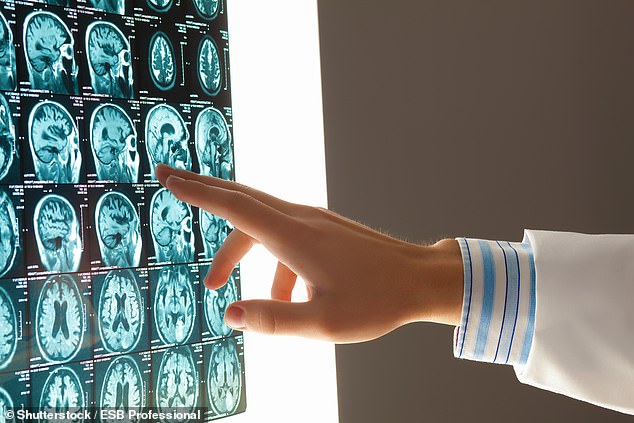Scientists have developed the primary take a look at of its form that may predict dementia as much as 9 years earlier than analysis – and with 80 % accuracy.
Consultants hope that these findings will present that Alzheimer's, the main reason for dementia, may very well be cured 'inside a couple of years'.
The researchers, at Queen Mary College of London, claimed their technique was superior to reminiscence checks or measurements of mind shrinkage, two instruments generally used to diagnose the illness.
Their take a look at scans the mind when it’s in 'idle mode' – a time period for when the mind is just not centered on a specific process.
He mentioned the approach had the potential to 'fill an enormous diagnostic hole', as it might enable individuals prone to dementia to be recognized and handled earlier than signs seem.

Researchers at Queen Mary College of London declare their technique is superior to reminiscence checks or measurements of mind shrinkage, two generally used diagnostic instruments. The take a look at makes use of mind scans taken when the mind is in 'idle mode' – the place the thoughts is just not centered on a specific process
The crew, led by Professor Charles Marshall, studied mind scans of greater than 1,100 individuals from the UK Biobank, a database containing genetic and well being data on half one million British individuals.
Of the 103 individuals with dementia, 81 had mind scans between 5 months and eight.5 years earlier than they had been formally identified.
The findings confirmed that their mind connectivity in the course of the inactive state was decrease than that of people that didn’t develop dementia.
Professor Marshall mentioned: 'Predicting who will develop dementia sooner or later can be important to growing therapies that may forestall the irreversible lack of mind cells that causes dementia signs.
'Though we’re getting higher at detecting the proteins within the mind that may trigger Alzheimer's illness, many individuals stay with these proteins of their brains for many years and don’t develop signs of dementia.
'We hope that the measure of mind perform now we have developed will give us extra correct details about whether or not an individual will truly develop dementia, and the way rapidly, in order that we are able to work out whether or not they would possibly profit from remedy sooner or later.'
These findings have been printed within the journal Nature Psychological Well being.
Professor Andrew Doig, an skilled in biochemistry on the College of Manchester, who was not concerned within the research, mentioned the findings might imply that an early predictive take a look at for Alzheimer's may very well be solely “a couple of years” away.
'Dementia is a posh situation, and it's unlikely we'll ever discover a easy take a look at that may precisely diagnose it.
'Nonetheless, inside a couple of years, there are good causes to imagine that we are going to be routinely testing for dementia in middle-aged individuals, utilizing a mix of strategies resembling blood checks adopted by imaging.

Alzheimer's illness is the commonest reason for dementia. This illness may cause nervousness, confusion and short-term reminiscence loss
'The MRI connectivity technique described right here might grow to be a part of this diagnostic platform.
'We’ll then have a greater understanding of which individuals are probably to profit from the brand new technology of dementia medication.'
However Dr Richard Oakley, affiliate director of analysis and innovation on the Alzheimer's Society, mentioned though this analysis was in a position to determine structural adjustments within the mind earlier than dementia signs seem, 'extra research are wanted involving various teams of individuals of various ages and ethnicities to totally perceive the advantages and limitations of this MRI scan as a diagnostic instrument.'
Tara Speirs-Jones, FMedSc, president of the British Neuroscience Affiliation and a professor on the UK Dementia Analysis Institute on the College of Edinburgh, additionally urged warning.
He mentioned that though any such mind scan is helpful, it’s 'not extensively obtainable neither is it correct in predicting who will go on to develop dementia.'


